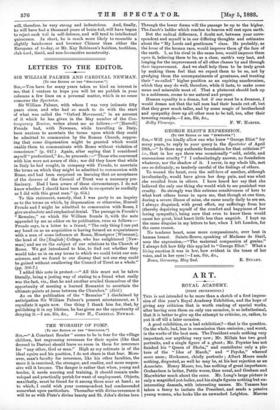LETTERS TO THE EDITOR.
SIR WILLIAM PALMER AND CARDINAL NEWMAN.
ETo THE EDITOR OF TEX "SPECTATOR."]
SIR,—You have for many years taken so kind an interest in me, that I venture to hope you will let me publish in your columns a few lines on a personal matter, which in no sense concerns the Spectator.
Sir William Palmer, with whom I was very intimate fifty years since, and who had so much to do with the start of what was called the "Oxford Movement," in an account of it which he has given in the May number of the Con, temporary Review, writes about me as follows :—" [Hurrell] Fronde had, with Newman, while travelling in Italy, been anxious to ascertain the terms upon which they could be admitted to communion by the Roman Church, suppos- ing that some dispensation might be granted which would enable them to communicate with Rome without violation of conscience." (p. 647.) Again, after saying that I considered myself" predestined," itc., he proceeds :—" Those who conversed with him were not aware of this; nor did they know that while in Italy he had sought, in company with Fronde, to ascertain the terms on which they might be admitted to communion with Rome, and had been surprised on learning that an acceptance of the decrees of the Council of Trent was a necessary pre- liminary. Had I been aware of these circumstances, I do not know whether I should have been able to co-operate so cordially as I did with this great man." (p. 654.)
To this statement, namely, that I was party to an inquiry as to the terms on which, by dispensation or otherwise, Harrell Fronde and I might be admitted to communion with Rome, I give an absolute and emphatical denial. The passage in Fronde's "Remains," on which Sir William founds it, with the note appended by me as editor on its publication, runs as follows :— Fronde says, in a letter to a friend, "The only thing lean put my hand on as an acquisition is having formed an acquaintance with a man of some influence at Rome, Monsignor [Wiseman], the head of the [English] College, who has enlightened [New- man] and me on the subject of our relations to the Church of Rome. We got introduced to him, to find out whether they would take us in on any terms to which we could twist our con- sciences, and we found to our dismay that not one step could be gained without swallowing the Council of Trent as a whole."
306-7-) I added this note in protest :—" All this must not be taken literally, being a jesting way of stating to a friend what really was the fact, viz., that he and another availed themselves of the opportunity of meeting a learned Romanist to ascertain the ultimate points at issue between the Churches." (Ibid.) As on the publication of the " Remains " I disclaimed by anticipation Sir William Palmer's present misstatement, so I repudiate it again now. One thing I thank him for, that, by publishing it in my lifetime, he has given me the opportunity of denying it.—I am, Sir, Jrc., Jour,' H., CARDINAL NEWMAN.


































 Previous page
Previous page